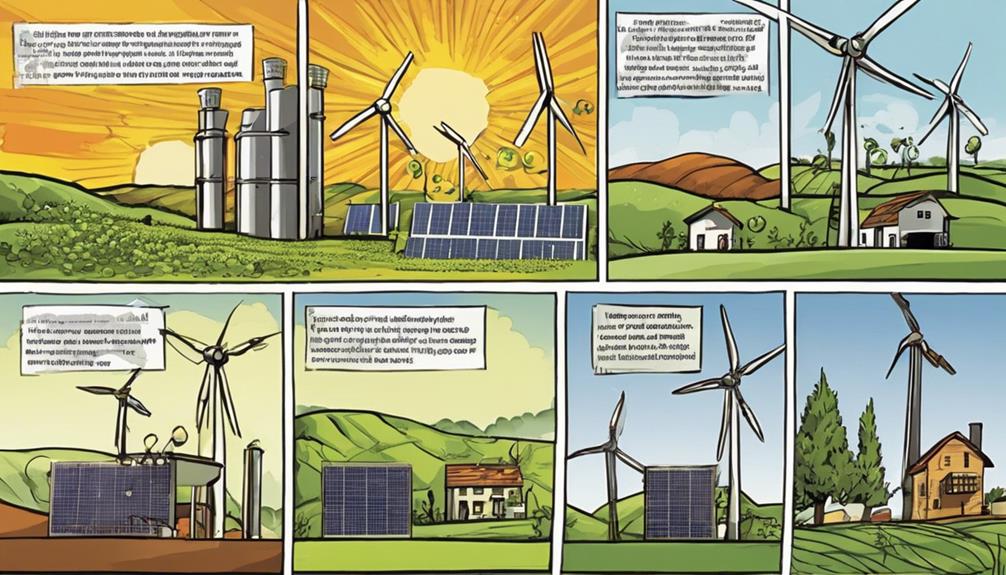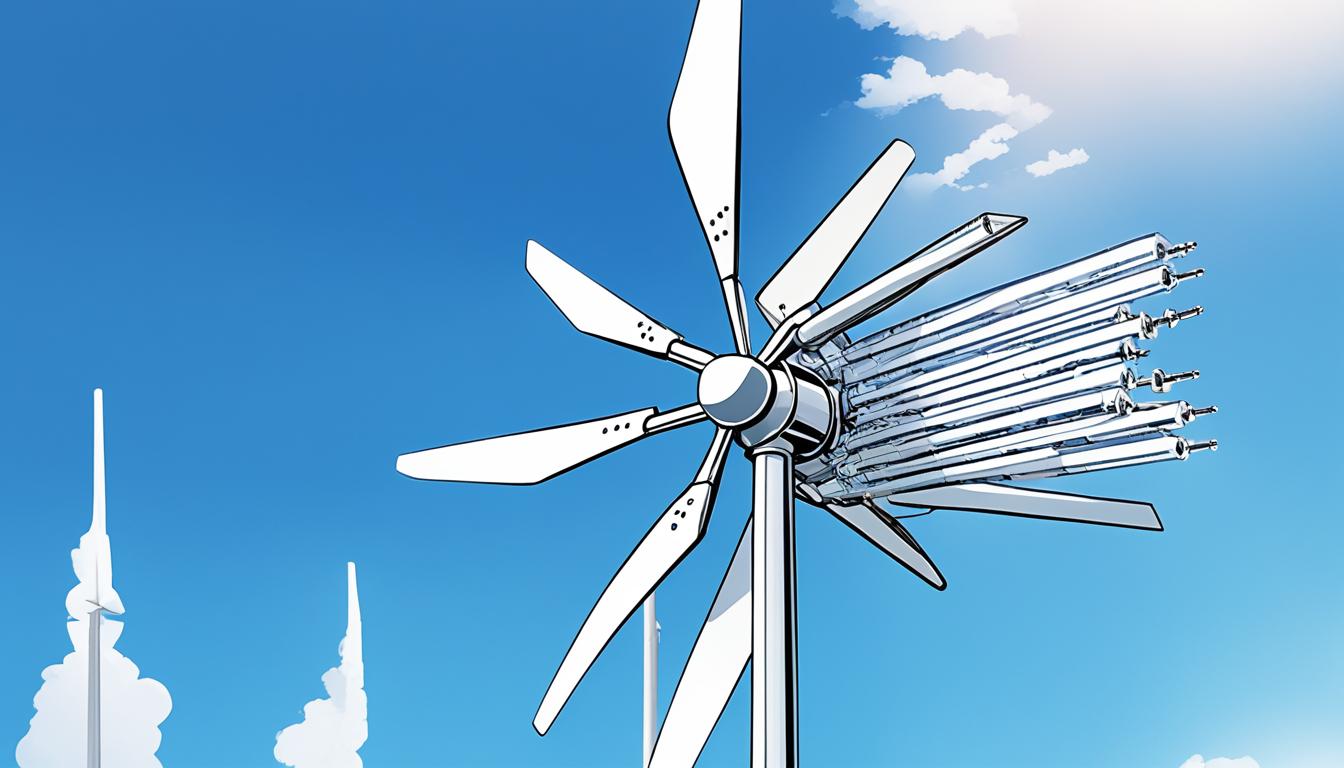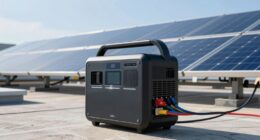In 2022, solar power accounted for 10.7% of Germany's electricity, showcasing a substantial renewable energy reliance. This emphasis on solar energy reflects the country's commitment to sustainable practices and green initiatives. The growing contribution of solar power is an essential component in Germany's energy landscape and supports its overall renewable energy goals.
Key Takeaways
- Solar power accounts for 10.7% of Germany's electricity in 2022.
- Solar output reached 68% in July 2023.
- Solar power is expected to reach a third of Germany's electricity generation by 2024.
- Germany aims for 80% of electricity from renewables by 2030.
- Nearly 10 GW of solar power installations were added in Germany in 2022.
Solar Power Development in Germany
Germany's solar power sector has experienced notable growth and development in recent years, with solar power accounting for 10.7% of the country's electricity in 2022.
The German solar power industry has been at the forefront of renewable power initiatives, with a remarkable growth rate in solar production. This growth is evident in the increasing number of new installations, solar farms, and advanced solar systems utilizing cutting-edge solar power technology, such as high-efficiency solar panels.
The focus on expanding solar energy capacity underscores Germany's commitment to sustainable energy sources. The emphasis on solar power development has propelled the country to become a global leader in solar energy, ranking third in the world with 807 watts of solar PV per capita.
The continuous advancements in the German solar sector not only contribute significantly to the country's energy mix but also pave the way for a more sustainable and environmentally friendly future.
Government Policies and Regulations

Government policies and regulations in the solar power sector play a pivotal role in shaping the growth and sustainability of renewable energy sources in Germany. The country's Feed-in Tariff (FiT) system has been instrumental in promoting rooftop solar installations, contributing significantly to the increase in solar power production. Germany's commitment to renewable energy is evident in the legislative reforms aimed at regulating annual PV growth and boosting the proportion of renewable sources in the energy mix.
To provide a clearer picture, below is a table highlighting key aspects of government policies and regulations in Germany's solar power sector:
| Aspect | Description |
|---|---|
| Feed-in Tariff | Supports rooftop solar installations and contributes to solar power growth in Germany. |
| Legislative Reforms | Aim to regulate annual PV growth and enhance the share of renewable energy sources in the mix. |
| Local Initiatives | Programs like PV panels for tenants in North Rhine-Westphalia promote solar energy adoption. |
Solar Power Generation and Contribution

Let's explore how solar power in Germany has been shaping the energy landscape. The significant contribution of solar power, accounting for over 10% of the country's electricity, highlights its growing importance.
With solar output hitting 68% in July 2023 and expected to reach a third of Germany's electricity generation by 2024, the growth and targets set for solar power are essential aspects to contemplate.
Solar Power in Germany
Solar power in Germany, a key player in the country's energy landscape, has seen significant growth in recent years. Here are some key points about solar power in Germany:
- Germany generated 60.8 TWh of electricity from solar power in 2022, representing 10.7% of the country's total electricity generation.
- Solar output reached a record 27.3% of total electricity generation in June 2023, showcasing the increasing role of solar power in Germany's energy mix.
- Solar panels in Germany achieve up to 980 full load hours annually, highlighting the efficiency and effectiveness of solar technology in the country.
Germany's commitment to renewable energy and the expansion of its solar industry have propelled solar power to the forefront of the energy shift. With solar power expected to contribute around a third of Germany's electricity generation in 2024, the future looks bright for solar energy in Germany.
Contribution to Energy
Germany's electricity generation greatly benefited from the substantial contribution of solar power in recent years. With solar power accounting for 10.7% of Germany's electricity in 2022 and generating 60.8 TWh of electricity, its impact on the country's renewable energy landscape is undeniable.
The contribution of solar power to Germany's energy mix hit a record high in June 2023, reaching 27.3% of total electricity generation. Solar panels in Germany are highly efficient, achieving up to 980 full load hours annually, showcasing the effectiveness of solar power in the region.
Looking ahead, solar power output is projected to continue its upward trajectory, with expectations set for it to reach around a third of Germany's electricity generation in 2024. As solar power continues to play an essential role in Germany's energy transformation, its contribution to the country's energy sector is poised to grow even further in the coming years.
Growth and Targets
Germany is making significant strides towards achieving its renewable energy target, with a focus on increasing solar power generation. As the country progresses towards its goal of 80% renewable electricity by 2030, solar power stands out as a key player in shaping the energy mix.
Here are some key points to highlight Germany's growth and targets in solar power generation:
- Solar power accounted for 10.7% of Germany's electricity in 2022, showcasing a substantial contribution to the energy mix.
- Germany generated 60.8 TWh from solar power in 2022, highlighting the significant output from solar installations.
- Solar power output in Germany saw a remarkable 60% increase in 2011 alone, demonstrating rapid growth in solar energy generation.
With renewables already covering more than half of German electricity consumption in the first half of 2023, the country's ambitious targets and the growth of solar power emphasize a promising future for clean energy in Germany.
Solar Technology and Capacity
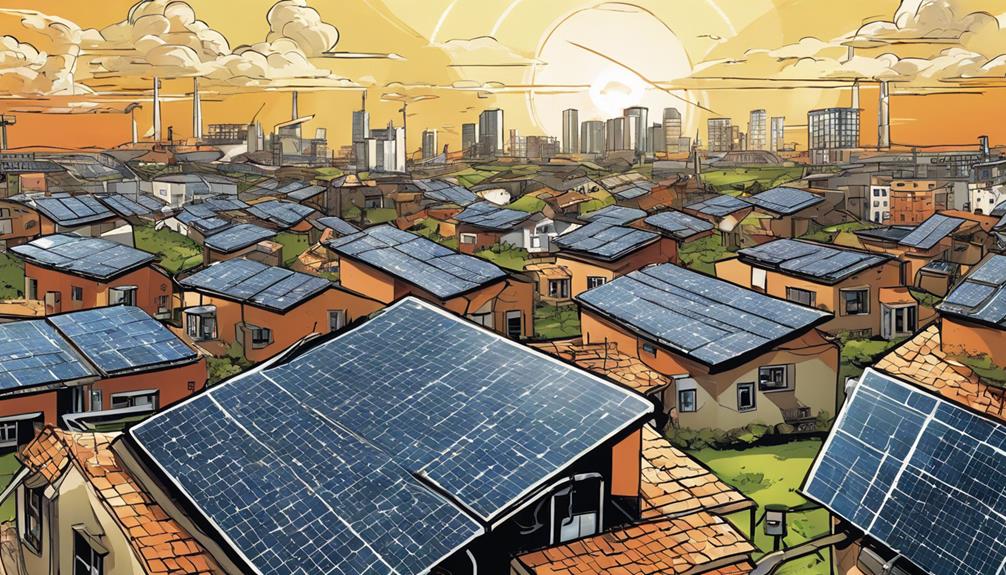
With an impressive capacity of 807 watts of solar PV per capita, Germany ranks third globally in solar technology utilization. Solar power plays a significant role in Germany's energy mix, contributing 10.7% to the country's electricity generation in 2022. The 60.8 TWh of solar power generated last year showcases the importance of renewables in Germany's electricity consumption. The country aims to increase the share of renewables, including solar energy, further.
Solar power technology isn't only pivotal for electricity production but also widely used for on-site engineering purposes in Germany. The high solar capacity in Germany demonstrates the country's commitment to sustainable energy sources. With advancements in solar technology and a focus on increasing renewables' contribution to the energy sector, Germany continues to lead in harnessing solar power. This emphasis on solar energy aligns with the country's goals of shifting towards a greener and more sustainable future.
Solar Parks and Installations in Germany
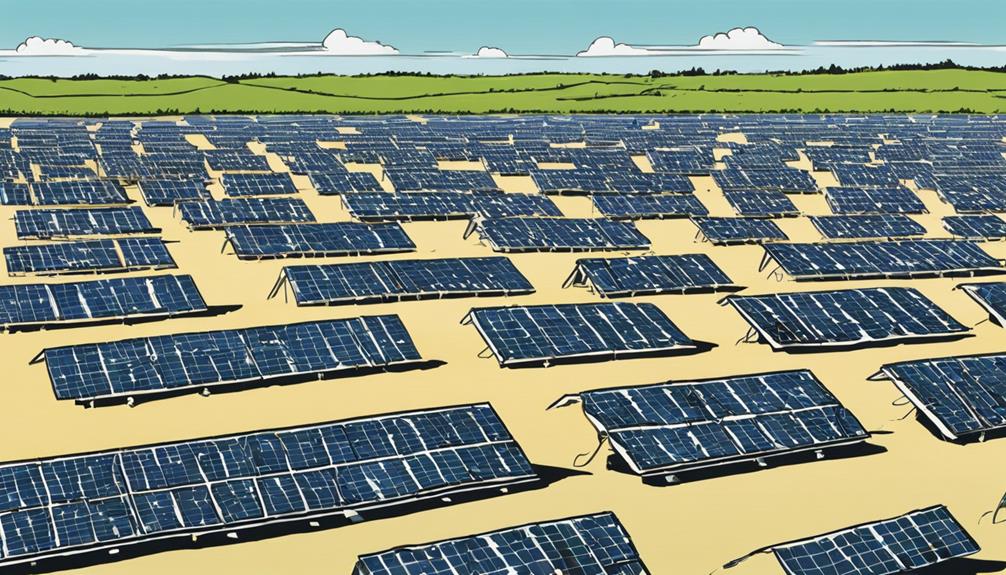
Amidst the surge in solar power installations, the proliferation of solar parks in Germany has greatly contributed to the country's renewable energy goals. These parks have played a pivotal role in boosting the country's solar power capacity and electricity generation from renewable sources.
Here are some key points regarding solar parks and installations in Germany:
- Record Production: In 2022, German solar farms set a remarkable milestone by producing a record 17,531 MWh of electricity in just one week, showcasing a substantial 40% increase in solar power output.
- 2030 Goals: Germany, with an eye on the future, aims to have 80% of its electricity sourced from renewable sources by 2030. The continuous expansion of solar parks and installations is essential in achieving this ambitious target.
- Installed Capacity: The country witnessed significant growth in its solar power sector, with nearly 10 GW of solar power installations added in 2022 alone. This increase in installed capacity underscores Germany's commitment to enhancing its renewable energy portfolio.
Solar Power Expansion in Germany

You should consider how Germany's solar power growth aligns with its ambitious energy transformation goals.
The government's strong support for renewable energy has facilitated the expansion of solar power in the country.
Understanding these dynamics is essential in evaluating Germany's progress towards achieving its targets for a sustainable and decarbonized energy sector.
Solar Power Growth
Germany continues to experience significant growth in solar power expansion, with solar output projected to reach around a third of the country's total electricity generation in 2024.
This surge in solar power growth is a proof of the commitment of the German industry towards renewables. The increasing contribution of solar power to Germany's electricity mix aligns with the nation's ambitious goals of achieving 80% renewable electricity by 2030 and full decarbonization by 2040.
In June 2023, solar power played an important role, contributing to a record 27.3% of total electricity generation. Moreover, German solar farms demonstrated their capacity by producing a remarkable 17,531 MWh of electricity in a week, showcasing a significant 40% increase from the previous week.
As solar power continues to expand its footprint in Germany, it not only sets new records for electricity production but also paves the way for a more sustainable energy future.
Government Support
With the growth of solar power in Germany, it's evident that government support plays an essential role in driving the expansion of this renewable energy source. Feed-in tariffs specifically support rooftop solar installations, contributing significantly to the rapid growth of solar power in the country.
Germany's energy mix benefits from this support, with solar power accounting for 10.7% of the country's electricity in 2022. The aim to achieve 80% renewable electricity by 2030 emphasizes the crucial role solar power plays in meeting these ambitious targets.
Notably, more than 7GW of PV capacity were installed annually in Germany during 2010-2012, showcasing the effectiveness of government policies in promoting solar energy. Leveraging feed-in tariffs hasn't only boosted the solar power contribution but also enabled Germany to export a record surplus of 34 TWh of electricity in 2014, demonstrating the country's success in utilizing solar power to meet its energy needs.
Energy Transition Goals
As Germany pushes towards its energy shift goals, solar power expansion plays an essential role in achieving renewable electricity targets by 2030 and full decarbonization by 2040.
The increasing solar output, accounting for 10.7% of Germany's electricity in 2022, highlights its significance in the country's energy generation.
With a goal of reaching 80% renewable electricity by 2030 and complete decarbonization by 2040, Germany recognizes the pivotal role of solar power in reshaping its electricity mix and reducing carbon emissions.
In July 2023, solar energy already constituted 68% of the electricity mix, showcasing its rapid integration into the grid.
Moreover, projections indicate that solar power will contribute around a third of Germany's electricity generation in 2024, underscoring its growing importance in achieving the country's ambitious electricity goals.
Through substantial solar power expansion, Germany isn't only diversifying its energy sources but also making significant strides towards a more sustainable and environmentally friendly energy transition.
Solar Power Output and Impact

Solar power output in Germany has greatly impacted the country's energy landscape, showcasing substantial growth and contribution to the electricity mix. With solar power accounting for 10.7% of Germany's electricity in 2022, it has become a significant player in the country's renewable energy portfolio.
Solar farms in Germany generated a record 17,531 MWh of electricity in a single week, highlighting the impressive output of solar energy. This source reached 68% of the electricity mix in July 2023, underscoring its increasing role in power generation.
Projections suggest that by 2024, solar power could represent around a third of Germany's electricity generation, indicating a promising growth trajectory for this clean energy source. Importantly, solar power has played an essential role in reducing carbon intensity, meeting electricity demand, and delivering environmental benefits to Germany.
As solar energy continues to expand, it's poised to further transform the country's power generation landscape.
Frequently Asked Questions
What Percentage of Germany's Electricity Is Solar?
To find out what percentage of Germany's electricity is solar, you can look at recent data showing that solar power accounted for 10.7% of the country's electricity in 2022 and contributed 27.3% in June 2023.
What Is Germany's Main Source of Energy?
In Germany, solar power shines brightly as a key player in the energy game. It's not just about the sun; renewables are leading the charge. Wind power blows in as a close runner-up.
Is Germany 100% Renewable Energy?
You aren't at 100% renewable energy yet. Solar power in Germany is significant but not the sole source. By 2030, the goal is 80% renewable. Keep pushing for a greener future!
What Is Germany's Largest Renewable Energy Source?
Solar power shines as Germany's dominant renewable energy source, illuminating a path to sustainability. Its rays power innovation and progress, leading the country towards an ambitious goal of 80% renewable electricity by 2030.
How Does Solar Energy Usage in Germany Compare to Other Countries at Similar Latitudes?
Germany has a strong relationship between solar energy and is a global leader in its usage. Despite being at a similar latitude to other countries, Germany surpasses them in solar energy production. The country’s aggressive investment in solar technology and favorable government policies have made it a shining example for the rest of the world.
Conclusion
So, next time someone questions the reliability of solar power in Germany, remind them that over 10% of the country's energy comes from the sun.
With government support and advances in technology, solar power is a growing and important part of Germany's energy mix.
So, don't underestimate the power of the sun in providing clean and sustainable energy for the future.

